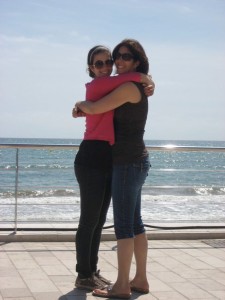I am the parent of a POTS kid. The purpose of this article is to give parents hope and constructive advice on how to get through this challenging period in your life.
I will first begin with where we are right now. My daughter is a senior in college, majoring in biology. She will be graduating this May with the hope of joining the medical profession. Her mission is to help other people, like herself. Although my daughter still experiences POTS symptoms from time to time, she has learned to accept them, work with her body, and continue with her life, even when she does not feel well. (Update: Her daughter finished college, went to grad school, and became a Registered Nurse!)
Our journey began eight years ago when my daughter was diagnosed with POTS at the age of 13 after having mononucleosis. She just did not get better and by week eight, her doctor sent us to see a specialist. We were blessed to have the best pediatrician in the area and she was able to make an educated guess.
Unfortunately, she was right. Postural orthostatic tachycardia syndrome (POTS) was the name that doctors gave the illness. We had never heard of it. My daughter missed most of 8th grade and later, part of 10th grade. She felt so ill that it was torture for her, most days, to get out of bed. The emotional toll that it took on her and our family was tremendous as we saw our worst nightmare unfold. We saw very pessimistic specialists who really did not know how to advise us. This was a relatively new condition with no known cure, only things to help the symptoms. Nothing seemed to work and our spirits tanked.
After reading a journal article written by a Johns Hopkins cardiologist about POTS, we contacted him. A month later, we were in his office. After examining my daughter, he was very optimistic. He said that her POTS would improve over time and that we all would get better at finding the right things to help. This was the hope that energized us and I am glad to say that he was right.
As I reflect on this tough period in all of our lives, there are things that really helped:
- Trust what your child is telling you.
- If it is at all possible, get counseling for your child and yourself. POTS takes an emotional toll on everyone.
- Try and get your child into a structured PT or exercise program (dysautonomiainternational.org/exercise has some great tips).
- Fill your refrigerator with a wide array of beverage choices and your pantry with salty snacks.
- Collect journal articles on POTS from reputable sources and have them available for everyone who works with your child. Assume that they know nothing about this. (You can find reputable POTS journal articles and tips on school accommodations on the Dysautonomia International website.)
- Get to know your child’s teachers, counselor, and administrators. Share the articles with them.
- Obtain an IEP or 504 Plan from your child’s school that allows extra time on tests, modified assignments, and modified due dates.
- Do not stress about missed school. Focus on feeling better.
- If you or your child decide to join a support group, try to find one with people who are hopeful and encouraging towards each other. Some of the support groups can be very negative, and this is not helpful for you or your child.
- Sadly, you quickly learn who your real friends are. Move on from them and don’t look back.
- Grow a thick skin. Parenting an adolescent is tough. The POTS makes it exponentially harder.
- Never give up hope.
Hopefully, after reading this article, you will be able to better see the whole picture of what it is like having a child with POTS. It does get better and a positive attitude goes a long way.
 Guest author Linda Deutsch is the parent of a 21-year-old POTS patient who was diagnosed in 2007, at age 13. Linda has experienced the ups and downs of having a teenager and young adult with POTS and has insights on what has worked for her daughter and what has not. She is dedicated to finding a cure for POTS.
Guest author Linda Deutsch is the parent of a 21-year-old POTS patient who was diagnosed in 2007, at age 13. Linda has experienced the ups and downs of having a teenager and young adult with POTS and has insights on what has worked for her daughter and what has not. She is dedicated to finding a cure for POTS.